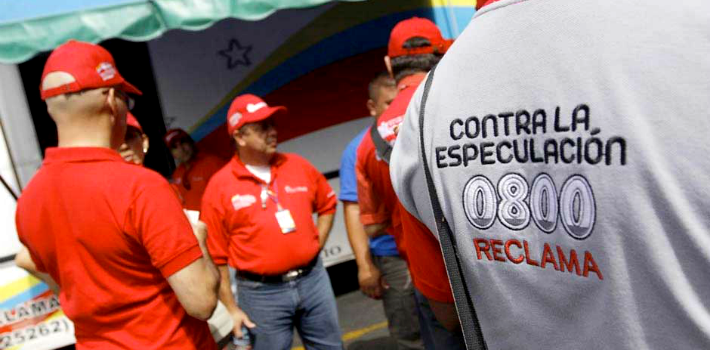
EspañolAmid rampant inflation and scarcity, Venezuela’s “hoarders” and “speculators” now face up to 10 years in prison, following President Nicolás Maduro’s reform of the Fair Prices Act. Critics, however, are quick to point out that the legislation does not clearly define what constitutes hoarding or speculating, allowing the government to target businesses that simply resell or stock up on certain items.
The Fair Prices Act, whose stated goal is to “consolidate the socialist economic order,” prescribes a wide-range of penalties for violators, from fines and temporary shutdowns to government intervention and seizures of warehouses, factories, shops, and transportation for up to six months.
As of November 9, the law grants the national government total control over the economy. It allows the National Superintendency for the Defense of Socioeconomic Rights to set profit margins according to economic activity, geographic location, distribution channel, or any other category. The superintendency has also capped all profits at a “fair” 30 percent of costs.
Business owners have complained that the way that the Venezuelan government calculates prices and profit margins does not account for all the expenses and investments necessary to run their firms.
Víctor Maldonado, the executive director of the Caracas Chamber of Commerce, Industry, and Services tells the PanAm Post that the reform strips away any autonomy firms had left, and prevents them from developing individual business strategies. Furthermore, he says the law does not consider advertising expenses, annual bonuses for employees based on sales, and replacement costs.
Maldonado says that the government’s policy has “reduced the penetration of the goods and services distribution systems.” He explains that there are now fewer people involved in the distribution of goods, which in turn affects employment, the normal operational functions of businesses, and the ability of firms to adequately supply the country.
In Venezuela, the government has complete control over all distribution channels and decides where goods are shipped. However, according to Maldonado, the Venezuelan state only has the capacity to administer food to 38.6 percent of the country’s distributors.
“The government has focused on the punitive aspects of the original law,” Maldonado explains. “With this reform, being an entrepreneur becomes the country’s most dangerous activity. We face officials knocking at our doors at anytime, and seizing, expropriating, or sending us to jail, without due process.”
The businessman argues that the Maduro administration’s ultimate goal is to deplete all inventories. The arbitrary application of the law allows the government to confiscate any merchandise that it deems to be “overstocked,” he says.
“The problem here is not hoarding, but bad economic policies. We cannot produce or import goods, because the government refuses to authorize foreign-exchange operations, and foreign credit is gone. It’s impossible to hoard goods when they’re not available,” he says, adding that the government uses the terms “hoarding” and “speculating” for purely political reasons.
Regulated Online Sales
As of November 11, Venezuelan authorities have arrested 15 people charged with selling overpriced products on social media. According to the modified legislation, the Fair Prices Superintendency (Sundde) can punish both traditional and online media that publish ads for “overpriced” goods.
A similar restriction has been in place since 2013, when the government passed a law to regulate the used-car market, setting fixed prices for automobiles. The law banned all online classified ads that offer vehicles at prices exceeding those set by the state.
Currently, buying a 10-year-old car in Venezuela can cost as much as US$10,000, based on the black-market exchange rate for the Venezuelan bolívar.
Sinking Production
According to World Bank’s 2016 Doing Business report, Venezuela maintains the costliest hurdles to starting and running a business in all Latin America.
Industrial production so far in 2015 has dropped by 75 percent due to the lack of raw materials, and the increasing debt owed to overseas suppliers, trade union Conindustria President Juan Pablo Olalquiaga told Venezuelan daily El Nacional. “As industrial activity continues to decline, the demand for services will follow suit. It’s a vicious circle,” he said, noting that the crisis hits small and medium firms the hardest.
Olalquiaga also notes that 80 percent of small factories in the country did not experience any gains in productivity in the first quarter of 2015, while 70 percent of those businesses say they will not make any major operational investments in what remains of the year.
 Versión Español
Versión Español












